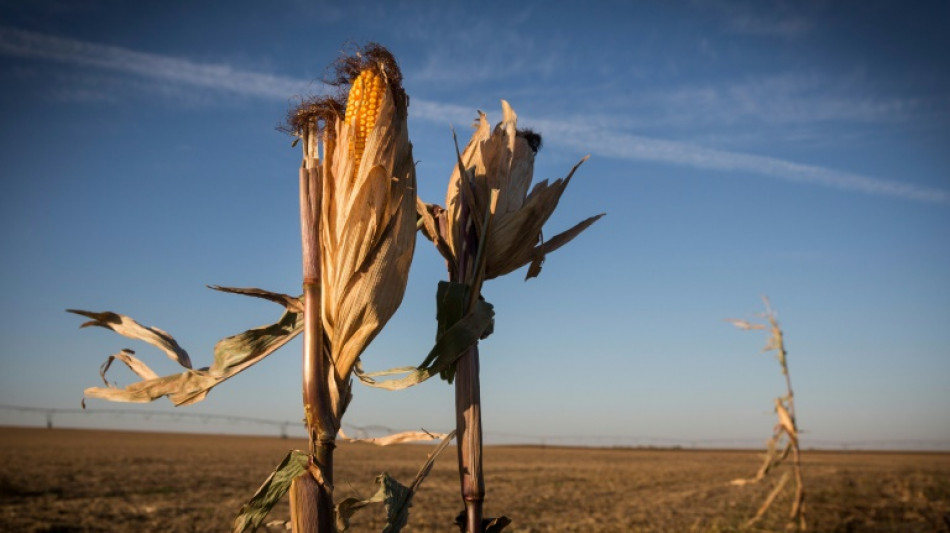
-
 Trail goes cold in UK abandoned babies mystery
Trail goes cold in UK abandoned babies mystery
-
Japan's Takaichi set to call February snap election: media

-
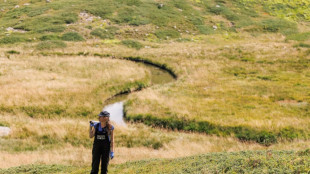 Scientist wins 'Environment Nobel' for shedding light on hidden fungal networks
Scientist wins 'Environment Nobel' for shedding light on hidden fungal networks
-
From bricklayer to record-breaker: Brentford's Thiago eyes World Cup berth

-
 Keys overcomes serve demons to win latest Australian Open warm-up
Keys overcomes serve demons to win latest Australian Open warm-up
-
As world burns, India's Amitav Ghosh writes for the future

-
 Actor Kiefer Sutherland arrested for assaulting ride-share driver
Actor Kiefer Sutherland arrested for assaulting ride-share driver
-
Gilgeous-Alexander shines as Thunder halt Spurs losing streak

-
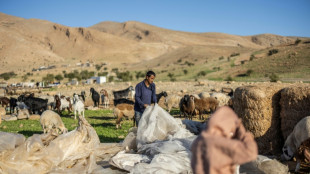 West Bank Bedouin community driven out by Israeli settler violence
West Bank Bedouin community driven out by Israeli settler violence
-
Asian markets mixed, Tokyo up on election speculation

-
 US official says Venezuela freeing Americans in 'important step'
US official says Venezuela freeing Americans in 'important step'
-
2025 was third hottest year on record: EU, US experts

-
 Japan, South Korea leaders drum up viral moment with K-pop jam
Japan, South Korea leaders drum up viral moment with K-pop jam
-
LA28 organizers promise 'affordable' Olympics tickets

-
 K-pop heartthrobs BTS to kick off world tour in April
K-pop heartthrobs BTS to kick off world tour in April
-
Danish foreign minister heads to White House for high-stakes Greenland talks

-
 US allows Nvidia to send advanced AI chips to China with restrictions
US allows Nvidia to send advanced AI chips to China with restrictions
-
Sinner in way as Alcaraz targets career Grand Slam in Australia

-
 Rahm, Dechambeau, Smith snub PGA Tour offer to stay with LIV
Rahm, Dechambeau, Smith snub PGA Tour offer to stay with LIV
-
K-pop heartthrobs BTS to begin world tour from April

-
 Boeing annual orders top Airbus for first time since 2018
Boeing annual orders top Airbus for first time since 2018
-
US to take three-quarter stake in Armenia corridor

-
 Semenyo an instant hit as Man City close on League Cup final
Semenyo an instant hit as Man City close on League Cup final
-
Trump warns of 'very strong action' if Iran hangs protesters

-
 Marseille put nine past sixth-tier Bayeux in French Cup
Marseille put nine past sixth-tier Bayeux in French Cup
-
US stocks retreat from records as oil prices jump
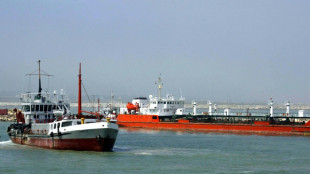
-
 Dortmund outclass Bremen to tighten grip on second spot
Dortmund outclass Bremen to tighten grip on second spot
-
Shiffrin reasserts slalom domination ahead of Olympics with Flachau win

-
 Fear vies with sorrow at funeral for Venezuelan political prisoner
Fear vies with sorrow at funeral for Venezuelan political prisoner
-
Pittsburgh Steelers coach Tomlin resigns after 19 years: club

-
 Russell eager to face Scotland team-mates when Bath play Edinburgh
Russell eager to face Scotland team-mates when Bath play Edinburgh
-
Undav scores again as Stuttgart sink Frankfurt to go third

-
 Fuming French farmers camp out in Paris despite government pledges
Fuming French farmers camp out in Paris despite government pledges
-
Man Utd appoint Carrick as manager to end of the season

-
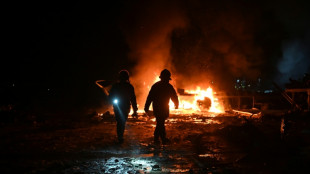 Russia strikes power plant, kills four in Ukraine barrage
Russia strikes power plant, kills four in Ukraine barrage
-
France's Le Pen says had 'no sense' of any offence as appeal trial opens

-
 JPMorgan Chase reports mixed results as Dimon defends Fed chief
JPMorgan Chase reports mixed results as Dimon defends Fed chief
-
Vingegaard targets first Giro while thirsting for third Tour title

-
 US pushes forward trade enclave over Armenia
US pushes forward trade enclave over Armenia
-
Alpine release reserve driver Doohan ahead of F1 season

-
 Toulouse's Ntamack out of crunch Champions Cup match against Sale
Toulouse's Ntamack out of crunch Champions Cup match against Sale
-
US takes aim at Muslim Brotherhood in Arab world

-
 Gloucester sign Springbok World Cup-winner Kleyn
Gloucester sign Springbok World Cup-winner Kleyn
-
Trump tells Iranians 'help on its way' as crackdown toll soars

-
 Iran threatens death penalty for 'rioters' as concern grows for protester
Iran threatens death penalty for 'rioters' as concern grows for protester
-
US ends protection for Somalis amid escalating migrant crackdown

-
 Oil prices surge following Trump's Iran tariff threat
Oil prices surge following Trump's Iran tariff threat
-
Fashion student, bodybuilder, footballer: the victims of Iran's crackdown

-
 Trump tells Iranians to 'keep protesting', says 'help on its way'
Trump tells Iranians to 'keep protesting', says 'help on its way'
-
Italian Olympians 'insulted' by torch relay snub


Farmers in US Midwest struggle amid prolonged drought
Months without rain have left farmers across the vast US Midwest, part of the country's essential "breadbasket," seeing crop yields in freefall, with some fields too damaged to harvest.
At the 4,000-acre (1,600-hectare) Tucker Farms in Venango, Nebraska, "we were only able to harvest... around 500" acres, most of it wheat, said Rachel Tucker.
Much of the rest had shriveled up under a relentlessly hot sun.
The drought has attracted grasshoppers, which threatened the flowers the Tuckers also grow -- until they brought in praying mantises to control the winged pests.
If the American West has been suffering through water shortages for years, the Midwest has not seen conditions this bad since 2012.
"It's even worse than 2012," said Tucker. "Much worse."
Her husband, whose grandfather farmed these same fields, says things have not been this bad since the so-called Dust Bowl days of the 1930s.
The story is just as grim to the south, in western Kansas.
"I was catching up with some older farmers this morning," said Marc Ramsey, whose family has farmed near the small town of Scott City for nearly a century.
"Guys that are in their 70s and 80s are saying, you know, they haven't even experienced anything like this in their lifetime. So it's pretty bad."
Rainfall has been almost nonexistent since late July, he said. Two inches "was all we've had, basically all year."
Rex Buchanan, director emeritus of the Kansas Geological Survey, said one thing seems different from the dry years of 2010-2012: "It seems like when the rain shut off, it just completely shut off."
- Dwindling groundwater -
Drought has hit the three major US crops: wheat, corn and soybeans, and the US Department of Agriculture recently had to lower its nationwide yield predictions.
Along With Kansas and Nebraska, the Midwestern state of South Dakota has also been hard-hit.
In normal times, these three states provide one-third of US winter wheat production, and one-fourth of the corn output.
Approximately 30 percent of Marc Ramsey's land is irrigated and, meaning that portion is doing better than his other fields. Tucker Farms' single irrigated field also fares better than the others.
But even some of Ramsey's irrigated fields are producing only 80 bushels of corn per acre, less than half the usual rate.
High levels of water usage have led to "pretty dramatic declines" in aquifers across western Kansas, Buchanan said, adding that farmers in some areas "have really struggled."
"They’ve seen some wells go dry. They’ve had to return to dryland farming," meaning without irrigation.
- 'You just worry' -
With water rights strictly limited, Buchanan said some farmers have banded together in agreements on more cautious use of subterranean water, drawing as much as 20 percent less than permitted.
Ramsey, like the Tuckers, carries crop insurance covering exceptional losses.
But a year like 2022 can push up premiums, which were already rising due to increased commodity costs.
Insurance "covers your cost of productivity, for the most part," Ramsey said. "And so we'll be here next year and try it again."
But insurance doesn't refill dwindling aquifers -- something that autumn rains usually take care of.
The lack of soil moisture "will be a concern going forward into winter and next spring without a change in what we are currently seeing," said Brian Fuchs, a climatologist with the National Drought Mitigation Center at the University of Nebraska-Lincoln.
Though Buchanan says that "there’s certainly an awareness (among farmers) about climate change," despite the political sensitivity of the subject in the United States.
Farming is always difficult and unpredictable work -- and in years like this, said farmer Rachel Tucker, "you just worry about the suicide rate."
"So I'm hoping that everybody can stay in high spirits, and hope for the best next year."
G.AbuHamad--SF-PST




